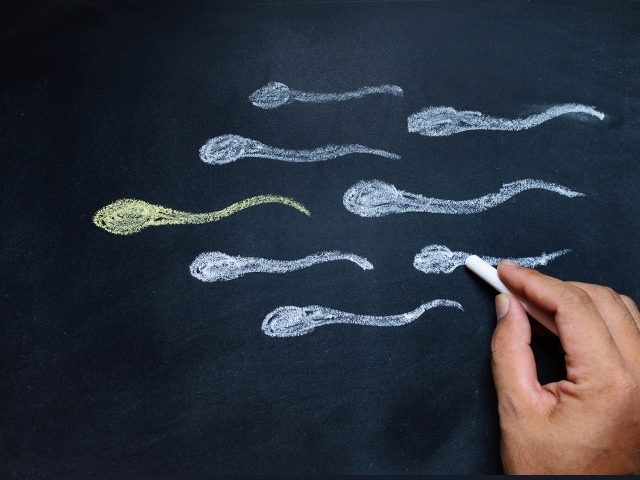Let's talk about male fertility
28 June 2017

28 June 2017

When generally speaking about infertility, the focus is often on female factors, however the reality is – it takes two to tango! After a female’s age, male factor infertility is the second most common reason a couple may have difficulty conceiving.
So ladies, make sure you forward this on to your fellas so they know everything they need to know about keeping their swimmers healthy and how they can complete a male fertility test.
We spoke to Professor Kelton Tremellen, one of our fertility specialists in South Australia, about all things male fertility test related.
Q: What is infertility?
A: Infertility is commonly described as the inability to conceive after a year of unprotected intercourse.
Q: Do most people fall pregnant within a year?
A: In general, half of all couples will fall pregnant within the first 2-3 months and 85% will fall pregnant within the first 12 months of trying.
Q: How common is male infertility?
A: The vast majority of couples will fall pregnant naturally within the first 12 months of trying however for approximately 1 in 6 couples they will experience difficulties trying to conceive. Research tells us that of the couples struggling to fall pregnant, 40% will be due to problems with sperm function, so called male factor infertility.
Q: What are some of the possible causes of male infertility?
A: Many factors can lead to a man becoming infertile. For a small minority there is a significant genetic issue causing poor sperm production such as breaks in chromosomes or parts of the male Y chromosome missing. For others there are hormonal causes, infections damaging the sperm outflow channels or problems with the testis such as testicular cancer or failure of the testis to descend into the scrotum early in life (cryptorchidism). Several medications can also negatively impact on sperm production and quality. However for the vast majority of men no major cause is found. In these cases “lifestyle issues” such as obesity, stress, excessive consumption of alcohol, smoking or exposure to heat can all have an impact on a man’s fertility. Some times when these lifestyle factors are removed, a man will regenerate healthy sperm after approximately 3 months.
Q: I hear that heat can also affect a man’s fertility, is that true?
A: The testis are located within the scrotum because it is at least 2 degrees cooler than core body temperature, since sperm production occurs best at these cooler conditions. Overheating a man’s genital region can therefore have a negative impact on his fertility. Saunas, spas and hot baths or occupational exposure to heat (smelters) all result in heating of the testicles and can damage a man’s fertility. Even working for long periods with a computer on the lap can overheat a man’s genitals. Nature has designed a man in such a way that when his body is too hot or cold it will aim to preserve his fertility by adjusting the position of his scrotum, however if his body is subjected to excessive and prolonged external heat then this natural cooling mechanism will not be sufficient. My advice, keep the baths and saunas to a minimum and the laptops off the lap!
Q: It’s widely known that a women’s fertility starts to decline in her early to mid 30s. Do men have a similar biological clock?
A: We know that male fertility slowly decreases with age, although not to the extent seen in women. We often hear through the media of men fathering children well into their ‘golden years’, however on average men who are older than 50 take 5 times as long to make their young partners pregnant compared to men who are under 25 years of age. A man who is over the age of 50 will generally have lower semen volumes and the concentration and motility of his sperm will also be lower than that of a 25 year old male. And a man who is over the age of 80 will have a 50% chance of having poor sperm quality, so while men can father children in their later life, it certainly becomes more challenging to conceive a healthy child. Even more concerning is that there is now good evidence suggesting the DNA quality of sperm declines with age and this may explain why children conceived by older fathers have a higher risk of health problems such as autism and schizophrenia.
Q: Will a man know if he is infertile?
A: Generally speaking, a man will only know he has fertility potential after he has had a male fertility test (semen analysis) and that test has confirmed he has sperm present, unless he has had children previously. Being in peak physical condition and good health is not a guarantee of fertility. Therefore we suggest that anyone who has concerns about their fertility status should see a doctor and possibly have testing.
Q: How do you determine a man’s fertility?
A: The most effective way to assess a man’s fertility is via a male fertility test called a Semen Analysis. I would suggest speaking with your Health Care Provider or a Fertility Specialist who can easily arrange this test.
Q: If a couple has been trying to conceive for a while without success, what should they do?
A: If the female partner is under 35 years old and they have not fallen pregnant after 12 months, or if the female partner is over 36 years old and they have been unsuccessful after 6 months, I would suggest they seek advice from their GP or a Fertility Specialist. However if it is clear that fertility is compromised, such as a history of infertility in a prior relationship or absence of menstrual periods, then obviously early presentation to a doctor is warranted. There are a range of female and male fertility tests that will provide insight into a couple’s fertility and not all couples will require IVF to fall pregnant.
For further advice on both male and female fertility or how to book a male fertility test, please make an appointment to see a fertility specialist or request a free 15 minute nurse chat.

Professor Kelton TremellonFertility Specialist - Reproductive Endocrinology And Infertility Sub-specialist
MBBS(Hons), PhD FRANZCOG, CREI, Grad Cert Mgmt
Professor Tremellen completed his training in Obstetrics and Gynaecology in 2001, topping the MRANZCOG examination in Australia and NZ. Following his specialty training, he commenced sub-specialty training in Reproductive Endocrinology and Infertility (CREI). His clinical interests include male infertility and recurrent miscarriage. He also conducts all fertility related surgery (such as; micro-surgical reversal of female sterilisation, removal of fibroids and correction of congenital uterine abnormalities such as a uterine septum).

Wherever you are on your journey, one of our supportive nurse enquiry team can help you understand your options and take the next step. These conversations are free and informative.